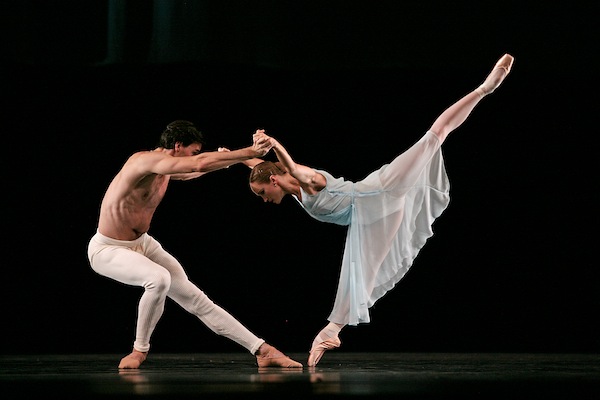 |
| a Pas de deux is typically danced to a slow movement |
The first really carefully-planned cassette mixes I made were of the middle slow movements of a variety of major works that I liked. This worked beautifully for when I was studying in a library, to keep me calm and focused. (I didn’t need fast, energetic music to keep me awake, because I was really into whatever I was working on; the music was more to cover the distracting sounds of undergraduates carrying on about something totally silly, from my exalted grad student point of view.) Since last week we listened to the high-energy finales from major works, I thought this week we’ll listen to the soothing sounds of slow movements.
Many of my friends, whom I have forced to listen to Archie’s Archives, have cracked up when there is a transition from something slow and serious to something quite unrelated. Such moments were frequent in the earlier broadcasts; I would follow a romantic duet from a serious opera with Steve Martin and Bernadette Peters singing Tonight you belong to me. It seemed perfectly logical to me, but not to everybody else. At least on this next show, it will all be slow movements, or mostly slow movements! In classical works, like symphonies and sonatas, these slow movements were a contrasting, lyrical interlude between more dramatic outer movements.
Part A
SignOn+Introduction
For a few weeks, Joseph LeBlanc and I have been giving workshops to a few young people enrolled in the Summer Program at Cappa, a community development project. A few of them consented to record a half-minute liner for Archie's Archives, which we hear at the beginning of the Introduction!
Bach: Concerto for Flute, Violin & Harpsichord, BWV 1044The slow movement is one of my favorites.
Bach: Concerto in D minor for Two Violins - Largo ma non tanto
Another of Bach's lovely slow movements.
Bach: Brandenburg Concerto No 5 in D major, BWV 1050 - Affettuoso
The slow movement of the famous Brandenburg No. 5. Only the solo instruments are heard here.
Bach: Concerto in C Minor for Oboe and Violin, BWV 1060 - Adagio
A third Bach slow movement, featuring just the violin and oboe, and continuo.
Part B
Handel: Watermusic - Air
The very popular tune for Horns in the Hamilton Harty version of the Watermusic Suite, taken from the Handel suite in F major.
Mozart: Concerto for flute, harp and orchestra in C major - Andantino
A lovely slow movement from Mozart.
Mozart: Clarinet Concerto - Adagio ma non troppo
One of Mozart's most lovely slow movements. This is taken from one of Mozart's last works, written at a time when he was painfully depressed.
Mozart: Violin Concerto No 1
Mozart did not take his violin concertos as seriously as he did his piano concertos. Nevertheless, this slow movement is utterly and effortlessly charming.
Part C
Mozart: Clarinet Quintet in A major, K 581 —Larghetto
A relatively little-known work, with a lovely slow movement.
Mozart Serenade in E Flat K 375, 3 Adagio
These serenades were written for groups of street musicians who formed amateur wind ensembles, to entertain the aristocracy in their villas. Mozart loved these fellows, and these slow movements are exquisite.
Mozart Piano Concerto 21 in C minor - Andante
A famous slow movement by Mozart, used in the movie Elvira Madigan.
Weird Al Yankovic / Robin Thicke: Word Crimes
In celebration of Weird Al's triumphant show in Williamsport.
Beethoven: Piano Sonata No 8 in C Minor, 'Pathetique', II - Adagio cantabile
One of the few movements I can play almost all the way through! Haha.
Part D
Beethoven: Piano Concerto No 2- II Adagio
The slow movements of one of Beethoven's lesser-known piano concertos. All five of his concertos are at least wonderful.
Beethoven: Piano Concerto No 5- II Adagio un poco motoThe slow movement of The Emperor Concerto.
I was running out of time, so we're playing just 3 minutes of these next three movements:
Mendelssohn: Violin Concerto in E minor, Op. 64 - 2 Andante
One of the loveliest single movements for violin.
Brahms: Violin Concerto - Adagio
Dvorak: Concerto for Violin and Orchestra in A minor, Op 53 II - Adagio, ma non tanto
Archie
‘’—“”

No comments:
Post a Comment